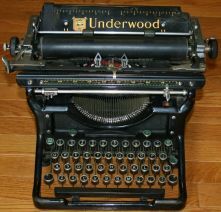Writing Tools I Use
Rob Kelley here, and I’ll start with a writing conference shout-out. I’m just back from The Writer’s Hotel 2025, held right here in Maine at the Sebasco Harbor Resort. The conference was wonderful, with craft sessions, readings by workshop participants and faculty, and extraordinarily useful workshop sessions reviewing our work. (My workshop helped me figure out a character introduction that I knew wasn’t working, which was AWESOME!).
The quality of the faculty and of the workshop participants is incredibly high, which makes it all that much more productive (and fun). These are the same folks who run High Frequency Press, my publisher for Raven (2025) and Critical State (2026).

A tool I do not use!
One of the discussions I had with my fellow workshop attendees was about what tools we all use when we write, which I find interesting because folks differ widely on what works (and doesn’t) for them.
My work starts in Evernote, a cloud-based note taking system. In there I have a whole story ideas file (and a blog ideas file!). When I get an idea for a book, I open a new note and start by adding some typical sections: Outline, Comps, Titles, and Research.
The outline evolves as I think more about the book, adding characters and plot arcs. Comps and Titles get filled in as I go, and can change as the book evolves. Research is what it sounds like, links to research on the place, the plot, the characters’ professions, law enforcement matters, a huge variety. Some of that research is never used, some has to be added to later as the book comes together.
When I’m ready to start writing I open up a new file in Scrivener. I’ve really come to like it as a drafting tool. I give each scene its own new text container, title (which is only for me to help remember it), and color code icon that shows whose POV it is in. This makes it easy to move things around as the book evolves, to make sure I’ve got good alternating POV voices, and to structure the book’s longer character and plot arcs.
When I think the book is ready to be edited, I compile it from Scrivener into Word where I start my detailed edits. I have a “Tic List” in Evernote that has a list of words I overuse and edits I need to actively make: adverbs that don’t do real work, passive voice, random interjections, overused articles, profanity (always too much!), etc.
Then I use the Word read-aloud feature. It’s amazing what you find when you hear your work read out loud. I don’t read it aloud myself not because I’m lazy (well, mostly not because I’m lazy), but because when I read I’ll sometimes correct grammar or word choice as I go, but when I hear it from my laptop, I catch it.
One thing I don’t do any more is use “editing tools” like Autocrit or Grammarly. Not because I am uncomfortable that they’ll AI scrape my text (they say they don’t) but because conscious editing by hand makes me more involved in the manuscript.
Only then would I share work with a beta reader, whose input is so, so valuable, as was the input from my workshop peers.
What tools work for you?
Lea Wait's Blog
- Lea Wait's profile
- 508 followers



